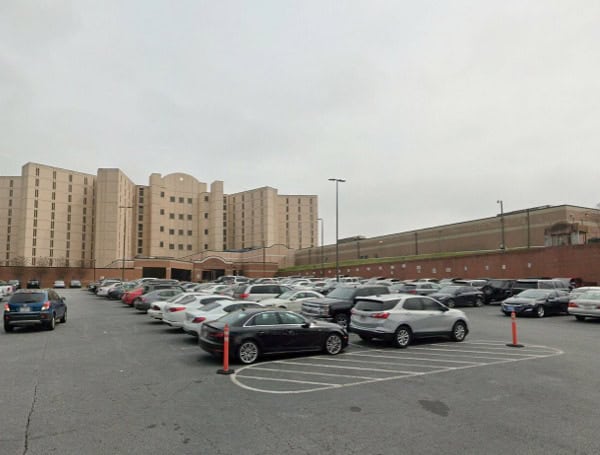FULTON COUNTY, GA. – In September 2022, Lashawn Thompson died alone in a squalid cell in the mental health unit of the Fulton County Jail. Thompson, a man with a documented history of mental illness and homelessness, was initially arrested for spitting at a Georgia Tech police officer and held on a simple battery charge related to an old warrant.
Three months after his arrest, Thompson was found slumped over in his cell, his head resting on a toilet. The medical examiner’s report revealed that his malnourished body was infested with severe lice, leading to the conclusion that he had been “neglected to death.”
READ: Georgia Jail Faces Federal Scrutiny Over Horrific Conditions: DOJ Report
Thompson’s tragic death sparked widespread outrage over the inhumane conditions in the jail. However, another death in the mental health unit, occurring months before Thompson’s, went unreported.
An unhoused man with severe mental illness had been arrested after breaking into a building to seek shelter.
While detained in the mental health unit, he ceased taking his medication, leading to a rapid decline in his health. He suffered a seizure and was transported to a hospital, where he eventually died in hospice care a month later.
Following Thompson’s death, two more individuals died in the mental health unit. Both men had serious mental health issues; one had a developmental disability. They were both killed by their cellmates and found with their feet bound. One of the victims was discovered wrapped in bedding, resembling a “mummy.”
READ: Texas Man Arrested For Alleged ISIS Terrorist Plot
In less than a year, four Black men with significant mental health needs died while held in the mental health unit of the jail.
In July 2023, a civil rights investigation was launched into the conditions at the Fulton County Jail under the Civil Rights of Institutionalized Persons Act (CRIPA), the Americans with Disabilities Act (ADA), and the Violent Crime Control and Law Enforcement Act.
Within weeks of the investigation’s start, six more Black men died in the jail. One inmate was found unresponsive after being strangled by his cellmate.
Just days later, escalating tensions within the facility led to a series of violent assaults across five units. At least seven people were stabbed, and one person was killed in the chaos.
READ: Hernando County Sex Offender Arrested For Failure To Register Vehicle, Resisting Arrest
The extensive investigation concluded with a damning finding: there is reasonable cause to believe that Fulton County and the Fulton County Sheriff’s Office are violating the constitutional and statutory rights of incarcerated individuals.
The investigation highlights a severe failure by the Fulton County Jail to protect inmates from significant risks of violence, including homicides, and exposes the systemic neglect faced by those with mental health needs in the facility.
Pattern of Violence and Poor Safety Measures
The investigation, initiated under the Civil Rights of Institutionalized Persons Act (CRIPA) and the Americans with Disabilities Act (ADA), found a pervasive culture of violence within the jail. Numerous stabbings and assaults were carried out using makeshift weapons fashioned from the jail’s deteriorating fixtures. Poor infrastructure, such as unlocked doors and a lack of secure barriers, has enabled these violent incidents, particularly against inmates with mental health needs.
The jail’s inadequate supervision, improper classification of inmates, and failure to maintain the facility have created an environment where assaults and sexual violence are rampant. Investigators found that the jail’s practices for reporting and addressing sexual violence were severely lacking, exacerbating the risks faced by inmates.
READ: Georgia Judge Rules Key Evidence Admissible In Laken Riley Murder Trial
Excessive Use of Force by Jail Staff
The report highlights a disturbing trend of excessive force by Fulton County Jail deputies and detention officers. Officers frequently used Tasers against inmates without adequate justification, often as a consequence of chronic understaffing and poor training. The lack of oversight and failure by supervisors to address misconduct have contributed to a culture of unchecked violence against those in custody.
Unconstitutional Living Conditions and Health Care Failures
The investigation found that living conditions at the Fulton County Jail do not meet basic constitutional standards. Many housing areas are in serious disrepair, with standing water, exposed wires, and severe pest infestations. The jail’s failure to provide adequate services, such as clean clothing, bedding, and sanitary meals, has led to malnourishment and illnesses among inmates.
Access to medical and mental health care is woefully inadequate. Medication administration gaps are common, leading to severe complications for inmates. The jail’s understaffing has impeded access to necessary care, while emergency medical situations often go unaddressed. Despite the overrepresentation of individuals with mental health issues, the jail environment exacerbates symptoms, increasing the risk of self-harm and suicide.
READ: Oklahoma Mom Trades 2-Year-Old Daughter For Methamphetamine During Drug Deal
Inhumane Use of Solitary Confinement and Discrimination
The investigation found that the jail’s use of restrictive housing poses a significant risk of harm, particularly to those with mental health needs. Inmates placed in isolation are not properly monitored for signs of psychological distress, and the practice disproportionately affects individuals with mental health disabilities, violating the ADA. The lengthy isolation periods are imposed without adequate due process, leading to severe mental health deterioration and increased risk of suicide.
The report also highlights the particularly devastating impact of restrictive housing on juvenile inmates. Georgia’s juvenile justice system ends at age 16, meaning that 17-year-olds are often housed at the jail, where they face violence, excessive force, and sexual abuse.
The psychological effects of isolation on these children are profound, worsening mental illness and causing long-term trauma. The jail’s failure to provide legally mandated special education services to these juveniles is a clear violation of the Individuals with Disabilities Education Act (IDEA).
Please make a small donation to the Tampa Free Press to help sustain independent journalism. Your contribution enables us to continue delivering high-quality, local, and national news coverage.
Android Users: Download our free app to stay up-to-date on the latest news.
Connect with us: Follow the Tampa Free Press on Facebook and Twitter for breaking news and updates.
Sign up: Subscribe to our free newsletter for a curated selection of top stories delivered straight to your inbox.




